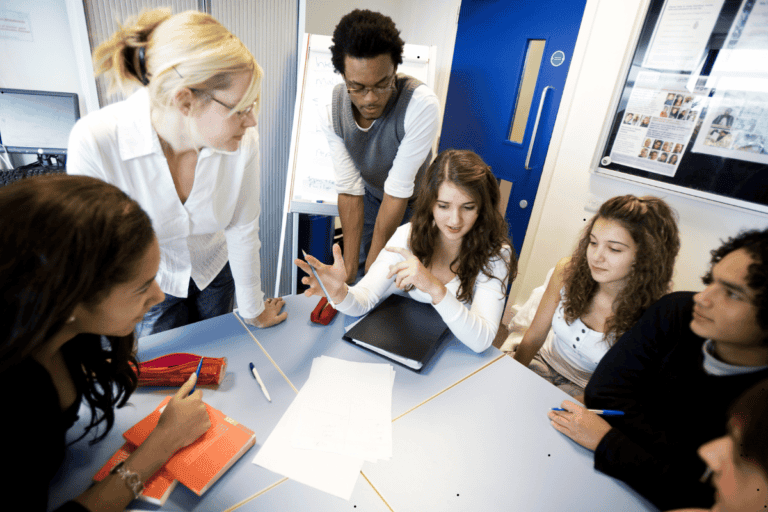Critical Thinking and Problem Solving for Students
As you embark on your educational journey, it is imperative to acknowledge the significance of honing your critical thinking and problem-solving skills. These abilities, often referred to as the backbone of success, enable you to navigate through the complexities of life with ease and confidence. But why exactly are they so crucial?
Well, let's just say that without them, you may find yourself ill-equipped to face the challenges that lie ahead. Intrigued? Well, get ready to uncover the numerous benefits of developing these skills and discover effective strategies to enhance your critical thinking and problem-solving abilities.
Key Takeaways
- Critical thinking and problem-solving skills are crucial for developing analytical abilities and breaking down complex problems.
- These skills help in evaluating the credibility and reliability of information, making well-informed decisions, and identifying possible solutions.
- Applying critical thinking in real-life situations involves adopting practical problem-solving approaches, gathering relevant information, and challenging underlying assumptions and biases.
- Fostering critical thinking in education can be done by encouraging open-ended questioning, promoting collaboration, providing real-world examples, and developing necessary skills for critical thinking and problem-solving.
Importance of Critical Thinking
Critical thinking is an essential skill for students, as it enables you to develop analytical skills and problem-solving techniques. By actively engaging in critical thinking, you're able to analyze information, evaluate arguments, and make well-informed decisions.
Developing analytical skills is important because it allows you to break down complex problems into smaller, more manageable parts. This process helps you to understand the various components of a problem and identify possible solutions. Analytical skills also enable you to evaluate the credibility and reliability of information, ensuring that you're basing your decisions on accurate and trustworthy sources.
Problem-solving techniques, on the other hand, help you to approach challenges in a systematic and logical manner. Through critical thinking, you can identify the root causes of a problem, consider different perspectives, and generate creative solutions. By honing your problem-solving skills, you become better equipped to overcome obstacles and find innovative ways to address issues.
Benefits of Problem Solving Skills
When it comes to problem solving skills, you'll find that they're highly beneficial in a variety of ways.
First, problem solving skills are important because they help you navigate through challenges and find effective solutions.
Additionally, these skills enhance your critical thinking abilities, allowing you to analyze situations more effectively and make informed decisions.
Lastly, problem solving skills provide practical application in real-life scenarios, equipping you with the ability to tackle problems and overcome obstacles in your personal and professional life.
Importance of Problem Solving
Problem solving skills offer a multitude of benefits, allowing you to navigate challenges with efficiency and creativity. Here are four reasons why problem solving is important:
- Enhanced critical thinking: Problem solving requires you to analyze situations, evaluate options, and make informed decisions. These skills strengthen your critical thinking abilities, enabling you to approach problems from different angles and find effective solutions.
- Improved creativity: Problem solving encourages you to think outside the box and come up with innovative solutions. By exercising your creativity, you develop the ability to see possibilities and explore new ideas, fostering a mindset of innovation and adaptability.
- Increased self-confidence: Successfully solving problems boosts your self-confidence and belief in your abilities. It gives you a sense of accomplishment and empowers you to tackle future challenges with a positive mindset.
- Better decision-making: Problem solving skills help you make informed decisions based on careful analysis and evaluation. This allows you to weigh different factors, consider potential consequences, and choose the best course of action.
Developing strong problem solving skills not only benefits you academically, but also equips you with valuable tools for success in various aspects of life.
Enhancing Critical Thinking
Developing problem solving skills not only enhances your critical thinking abilities but also equips you with valuable tools for success in various aspects of life. By improving analysis skills and logical reasoning techniques, you can become a more effective problem solver. This will enable you to tackle complex issues with confidence and make well-informed decisions. The benefits of problem solving skills extend beyond academic settings and can positively impact your personal and professional life. Take a look at the table below to understand how enhancing your critical thinking abilities through problem solving can benefit you:
| Benefits of Enhancing Critical Thinking |
|---|
| Improved decision-making skills |
| Increased creativity |
| Enhanced problem-solving abilities |
| Better communication skills |
| Increased self-confidence |
Practical Application Skills
Enhancing your problem-solving skills can provide you with practical application skills that are beneficial in various aspects of life. By improving your ability to solve problems, you can develop valuable application techniques that can be applied in different situations.
Here are four benefits of problem-solving skills:
- Better decision making: Problem-solving methods help you analyze situations, evaluate options, and make informed decisions.
- Effective communication: Problem-solving skills enable you to articulate your thoughts, ideas, and solutions effectively, facilitating better collaboration and understanding.
- Increased adaptability: Problem-solving techniques teach you to think creatively and adapt to new challenges, allowing you to navigate change with ease.
- Enhanced productivity: With strong problem-solving skills, you can identify and address obstacles efficiently, leading to increased productivity and achievement of goals.
Strategies to Develop Critical Thinking
To effectively cultivate critical thinking skills, you must actively engage in a variety of strategies that encourage thoughtful analysis and logical reasoning. Developing strategies that enhance your critical thinking skills is essential for success in academics and beyond.
One effective strategy is to ask probing questions. By questioning the information presented to you, you can gain a deeper understanding and evaluate its validity.
Another strategy is to analyze and evaluate arguments. This involves identifying the main claims and supporting evidence, assessing the strength and weaknesses, and determining if the argument is logical and well-reasoned.
Additionally, practicing active listening and effective communication skills can enhance your critical thinking abilities. Actively listening to others' perspectives and engaging in meaningful discussions can broaden your thinking and challenge your own assumptions.
Lastly, seeking out diverse perspectives and engaging with different viewpoints can foster critical thinking skills by exposing you to alternative ideas and encouraging open-mindedness.
Enhancing Problem-Solving Abilities
Improving problem-solving abilities is crucial for students to effectively navigate complex challenges and find innovative solutions. Developing practical problem-solving techniques not only enhances critical thinking skills but also prepares students for success in the workplace.
Here are some strategies to enhance your problem-solving abilities:
- Break down the problem: Analyze the problem by breaking it down into smaller, more manageable parts. This allows you to identify the root cause and better understand the problem as a whole.
- Seek different perspectives: Engage in discussions and collaborate with others to gain different perspectives. This helps you to see the problem from different angles and fosters creative thinking.
- Utilize critical thinking tools: Learn and apply various critical thinking tools such as mind mapping, SWOT analysis, and the five whys technique. These tools provide structured approaches to problem-solving and help you think more critically.
- Practice problem-solving in real-life scenarios: Apply problem-solving techniques to real-life situations, such as work projects or personal challenges. This allows you to develop practical problem-solving skills that can be directly applied in the workplace.
Enhancing your problem-solving abilities not only improves your critical thinking skills but also prepares you for the challenges you'll face in the workplace. By applying practical problem-solving techniques, you'll be better equipped to navigate complex problems, find innovative solutions, and excel in your chosen career.
Applying Critical Thinking in Real Life
When it comes to applying critical thinking in real life, it's important to adopt practical problem-solving approaches.
This involves analyzing and evaluating situations from different perspectives, gathering relevant information, and considering the potential consequences of different decisions.
Real-Life Critical Thinking
Applying critical thinking in real-life situations requires actively analyzing and evaluating information to make informed decisions or solve complex problems. In business, critical thinking plays a crucial role in decision making. Here are some ways you can apply critical thinking in real-life situations:
- Question assumptions: Challenge the underlying assumptions and biases that may be influencing your thinking.
- Seek multiple perspectives: Consider different viewpoints and gather diverse opinions to gain a comprehensive understanding of the situation.
- Evaluate evidence: Assess the credibility and relevance of the information available to you before making a judgment or forming an opinion.
- Think creatively: Explore innovative solutions and approach problems from different angles to generate new ideas.
Practical Problem-Solving Approaches
A practical approach to problem-solving in real-life situations involves actively engaging critical thinking skills to analyze and evaluate information for informed decision-making or complex problem resolution.
When faced with a problem, it's essential to employ effective decision-making techniques and problem-solving strategies. One such technique is the SWOT analysis, which helps identify strengths, weaknesses, opportunities, and threats associated with a situation or decision. By thoroughly assessing these factors, you can make more informed decisions and devise strategies that leverage your strengths and opportunities while mitigating weaknesses and threats.
Additionally, the 5 Whys technique can be used to delve deeper into the root cause of a problem by continuously asking 'why' until the underlying issue is identified.
These practical problem-solving approaches enable you to approach real-life situations with a critical and analytical mindset, leading to more effective decision-making and problem resolution.
Fostering Critical Thinking in Education
To foster critical thinking in education, educators must actively engage students in analytical and problem-solving activities. By incorporating these strategies, students can develop the necessary skills to think critically and solve complex problems effectively.
Here are four ways educators can foster critical thinking in the classroom:
- Encourage open-ended questioning: By asking thought-provoking questions that have multiple possible answers, educators can challenge students to think critically and consider different perspectives. This helps develop their ability to analyze and evaluate information.
- Promote collaboration: Group activities and discussions encourage students to engage in critical thinking by listening to different viewpoints, analyzing information collectively, and developing well-reasoned arguments. Collaboration also enhances their problem-solving skills.
- Provide real-world examples: By connecting classroom concepts to real-life situations, educators can help students see the relevance and practicality of critical thinking. This allows them to apply their skills in meaningful ways and understand the impact of their decisions.
- Offer opportunities for reflection: Providing time for students to reflect on their thinking processes and evaluate their own problem-solving strategies helps them become more aware of their strengths and weaknesses. This self-reflection fosters continuous improvement and development of critical thinking skills.
Conclusion
So, next time you hear someone say that critical thinking and problem solving skills aren't important for students, ask them to consider this: in a world that's constantly changing and evolving, these skills are essential for success.
By developing critical thinking abilities and problem-solving skills, students are equipped with the tools they need to navigate challenges, make informed decisions, and be adaptable in any situation.
Don't let anyone downplay the importance of these skills – they're the key to unlocking a brighter future.







